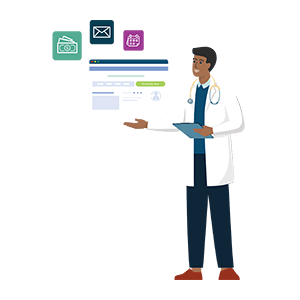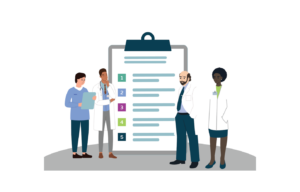4 Revenue Benefits of a Healthcare Scheduling Software System

By Chloe From Clearwave | September 5, 2023
One technological solution that has proven to be a game-changer for patient acquisition and practice success is patient self-scheduling software. These systems offer a range of benefits that not only streamline scheduling processes but also have a positive impact on the revenue streams of specialty practices. Keep reading to learn five key revenue benefits that these software systems bring to specialty practices!
1. Waitlists Can Maximize Appointment Opportunities
Healthcare scheduling software systems can equip specialty practices with efficient tools. One of these extremely important tools is waitlist management, which is essential for revenue optimization in specialty practices. When appointments are canceled or rescheduled, an automated waitlist system can promptly notify waitlisted patients, enabling them to quickly fill those openings, converting potential losses into revenue-generating opportunities — all without staff intervention.
The strategic utilization of previously unfilled appointment slots directly contributes to increased earnings and realized revenue for your physicians and practice.. By matching open slots with suitable patients from the waitlist, a waitlist system can minimize gaps and enhance patient satisfaction by ensuring timely care access. This is especially important since recent studies report that “seeing a practitioner quickly” is becoming a significant challenge for patients, with 27% of patients noting their frustrations in a recent survey.
Instructing staff to educate patients about waitlist benefits can encourage patients to participate, further amplifying revenue opportunities. Patient-centric self-scheduling solutions also help, offering convenience while reducing staff workload.
2. Real-time Automation Leads To Seamless Bookings
Gone are the days of solely manual appointment scheduling, which can lead to confusion and increased potential for errors. In fact, recent surveys show that 40% of patients found the process of scheduling appointments to be a challenge. Healthcare scheduling software systems operate in real-time, automating the appointment allocation process. This feature ensures that appointments are booked based on accurate, up-to-date information, eliminating the risk of double bookings.
In today’s fast-paced world, patients expect convenience and accessibility when it comes to managing their healthcare appointments. With the advent of 24/7 online scheduling platforms, practices now have the means to put patient acquisition on autopilot. Patients are able to seamlessly book their appointments during weekends, after office hours, or even when the front-desk staff is managing high phone traffic. This directly addresses the concerns that have led patients to seek care elsewhere in the past. Additionally, it ensures that patients aren’t being deterred by the inconvenience of office hours or long phone-hold times.
Nearly 61% of patients reported that they’ve skipped doctor appointments altogether due to challenges associated with scheduling, including being directed to schedule appointments via a traditional phone call. By catering to their scheduling preferences, practices can not only retain more patients but also capture those who would have otherwise sought care elsewhere due to scheduling constraints or hold times.
High phone hold times can also lead to patient frustration and missed opportunities for appointment bookings. By integrating an online self-scheduling system, practices can not only reduce phone hold times but also capture abandoned call revenue. A simple hold-message directing patients to book online can make a significant difference, converting potentially lost patients into scheduled appointments.
3. Reduced Staff Workload, Shifting Focus to Value-added Tasks
Healthcare scheduling software systems also bring relief to staff members by automating routine scheduling tasks. This reduction in administrative burden frees up staff time, allowing them to focus on more strategic and revenue-generating activities.
Whether it’s nurturing patient relationships, generating marketing initiatives, or refining operational processes, staff members can contribute directly to the growth of the specialty practice’s revenue. This newfound time can be dedicated to professional development, fostering a team that’s well-equipped to adapt to the evolving healthcare landscape.
As staff members transition from mundane scheduling tasks to value-added responsibilities, their job satisfaction and morale are likely to improve. Positive changes in the workplace not only increase employee retention, but also make patients happier.
An engaged and motivated staff is more likely to provide exceptional patient care, which nurtures patient loyalty and boosts referrals. Empowered staff members lead to a healthier bottom line and a thriving specialty practice.
4. Brings in More Patients: Convenience Increases Likelihood of Booking
According to recent surveys, 82% of patients prefer a provider who offers online scheduling. The ease and convenience of online scheduling provided by healthcare scheduling software systems can significantly attract new patients to specialty practices.
Patients today appreciate the ability to book appointments at their convenience, without the need for phone calls or manual coordination, anytime they want. This convenience factor can lead to increased patient loyalty and referrals, further expanding the practice’s patient base and revenue potential. Additionally, this modern approach aligns seamlessly with the preferences of tech-savvy generations, enhancing the practice’s reputation as forward-thinking and patient-centered.
Elevating Revenue Potential through Advanced Scheduling Solutions
Healthcare scheduling software systems have emerged as a transformative solution for specialty practices, offering a multitude of revenue-driven advantages. From effectively managing waitlists to real-time automation, reducing staff workload, attracting more patients, and optimizing appointment schedules, these systems serve as catalysts for enhanced revenue streams.
In the competitive landscape of specialty practices, embracing technology to streamline scheduling not only improves operational efficiency but also contributes directly to revenue growth. By investing in a healthcare scheduling software system, specialty practices position themselves for a future of patient care and financial success.
Don’t miss out on valuable insights to enhance your practice! Dive into our comprehensive eBook, “5 Ways to Bring in More Patients Than Ever Before.” This guide is a treasure trove of strategies designed to amplify your patient influx and supercharge your healthcare facility’s success!




